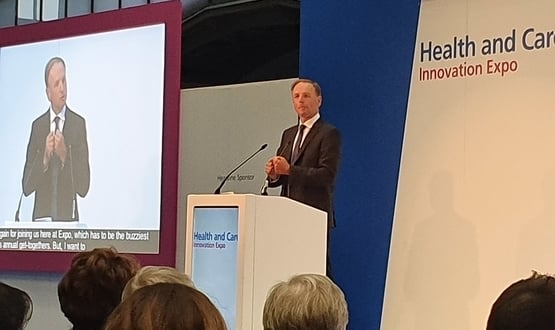The chief executive of the NHS is to stand down at the end of July.
NHS England and Improvement confirmed Sir Simon Stevens has “formally notified the NHS England Board of his decision”.
Sir Simon Stevens has today formally notified the NHS England Board of his decision to stand down as planned at the end of July, after more than seven years as NHS chief executive. pic.twitter.com/1QhHh9vmGs
— NHS England and NHS Improvement (@NHSEngland) April 29, 2021
The government also announced that upon stepping down, Stevens would be made a peer.
NHS England and Improvement said in a press release that Stevens had “confidentially notified the NHS England Board last year of his intended departure”.
Following the announcement an open competitive recruitment process for Stevens successor will take place. The appointment of the board’s chosen candidate is then subject to approval by the secretary of state for health and social care.
The aim is to have a successor appointed before Stevens steps down on 31 July, NHS England and Improvement said.
Stevens, became the head of NHS England on 1 April, 2014 and first joined the health service in 1988 through its graduate management programme. His previously worked in both the public and private sector, including stints at 10 Downing Street and the Department of Health.
In 2020, Stevens was knighted for his services to health and the NHS.
When it comes to technology, Stevens has previously called for greater investment in diagnostics and infrastructure while also speaking positively about the use of artificial intelligence (AI) and machine learning in the NHS.
Speaking at the Health and Care Innovation Expo in 2018, Stevens singled out DeepMind’s research with Moorfields Eye Hospital NHS Foundation Trust, saying such research helps with “diagnostic bottlenecks” that can occur within the NHS, and told audience members that they will be seeing “a lot more of that over the next five years”.
In 2014, Stevens also told the NHS not to be “gun shy” of technology after its experience with the National Programme for IT, while a year later he advocated the for a digital urgent care ‘front door’ for the health service.
Lord Ara Darzi, NHS England board member, and professor of surgery and director of the Institute of Global Health Innovation at Imperial College London and said Stevens has supported innovation in the health service.
“While Simon’s announcement has been widely expected, it’s hard to think of anyone who has had a more profound and positive impact on the NHS in its seven decades,” he said.
“As well as ensuring – against all the odds – that the NHS has successfully made it through both austerity and the Covid pandemic with its reputation rightly enhanced, he has initiated and overseen the most important and comprehensive redesign of services since 1948.
“He has also been a huge supporter of innovation, and has given the green light to NHS investment in a wide range of practical clinical improvements ranging from modern cancer treatments to groundbreaking personalised gene therapies for rare diseases.”


1 May 2021 @ 23:10
===